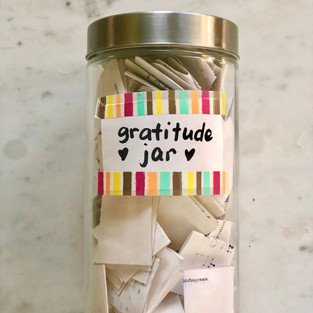
"A grateful heart is a magnet for miracles."
I came across this sentiment often, desperately wanting to become a magnet for miracles.
But the truth was, I felt silently guilty because I didn't really know how to "be grateful".
I loved my family and friends with all my heart. I said please and thank you all the time. But real gratitude? The kind that changes your life?
I always figured gratitude firmly belonged in the land of grown-ups who have it all figured out. 😜
I was curious about how gratitude rewires your brain, which I'd heard about, but didn't quite understand. Here's what I dug up:
How Gratitude Rewires Your Brain
Psychology Today reports that those who keep gratitude journals show:
more determination
more attention
more enthusiasm
more energy and,
(perhaps not surprisingly) more optimism
But better sleep, decreased depression and fewer aches and pains?
How can this be?
"The National Institutes of Health (NIH) found that subjects who showed more gratitude had higher levels of activity in the hypothalamus, which controls a huge array of essential bodily functions (eating, drinking, sleeping).
Gratitude also directly activates brain regions associated with the neurotransmitter dopamine. Dopamine feels good to us (aka the “reward” neurotransmitter.)
Here's how this works:
Gratitude engages your brain in a virtuous cycle. Your brain only has so much power to focus its attention. It can't easily focus on both positive and negative stimuli at the same time.
So once you start seeing/noticing/documenting things to be grateful for, you're programming your brain to start looking for more good things to be grateful for.
How to Start Being "More Grateful"... like Today
Gratitude requires an appreciation of the positive aspects of your current situation.
I found that I felt a bit dorky when I started. I found myself kind of detached from feeling strongly about big-picture things like "air to breathe" and "having two legs" at first, so I tried to focus on specific moments instead.
Things like, "stealing a few extra moments of cuddles this morning before school" and "dinner was surprisingly edible!" were easier to document.
Gratitude is not a comparison. (Sometimes noticing what other people don’t have may help you see what you can be grateful for, but you actually have to show appreciation for what you have, for it to have an effect.)
Gratitude takes practice, like any other skill.
After a while, I noticed my general mood did improve, so I stuck with it.
I try to start the day by listing 3 things I'm grateful for. My goal is to bookend my day with gratitude in the evening. Whoa. Baby steps.
P.S. I'm grateful for this pupper. 🐶
UPDATE:
We started keeping a Gratitude Jar. At dinnertime, each of us wrote down 3 things we were grateful for on little note papers, and on Sunday night we'd dump them out and read the week's entries (eventually transferring them to a bigger jar). Reading them out loud became a real highlight.
Later, I picked up these little 3 minute Gratitude Journals for the kids. With these we've had some hits and misses. Still plugging away!








Comentarios